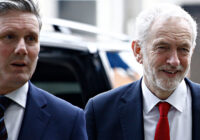In bids to enhance their soft power, Gulf states run the risk of reputational damage.
Saudi Arabia has become the latest Gulf country to discover that investment in European soccer to achieve national and corporate branding, risks reputational damage when potentially discriminatory government and company policies are exposed.
With Qatar taking a public relations beating for the working and living conditions of foreign laborers involved in construction of infrastructure related to its hosting of the 2022 FIFA World Cup, second tier German soccer club FSV Frankfurt terminated a sponsorship agreement with the state-owned Saudi Arabian airline, Saudia.
Club spokeswoman Ann-Katrin Hautk said the agreement had been terminated because the airline refuses to transport passengers who carry Israeli passports. US critics have called for the barring of Saudia from US airports.
It was not immediately clear how much the sponsorship deal, which involved placing a Saudi airlines model aircraft in Frankfurt’s Volksbank Stadium, was worth. FSV cancelled the agreement after German media accused the airline of anti-Semitism and Frankfurt municipal officials and prominent German Jews denounced it.
“FSV is selling principles for cheap sponsorship money… Saudi Arabia is a dictatorship, Israel is a democracy in the Western sense,” Frankfurt daily Frankfurter Allgemeine Zeitung quoted Michel Friedman, former deputy chairman of the Central Committee of Jews in Germany, as saying.
Local bank and major FSV sponsor Frankfurter Volksbank and FSV, after which the club’s stadium is named, said it was “irritated” by the agreement with an airline that has discriminatory policies. The bank said it finds any discriminatory policy unacceptable. Local politicians warned that money was not a license to engage without consideration with any potential sponsor.
Adding insult to injury, FSV announced on the same day of the cancellation a partnership with TuS Makkabi Frankfurt, a local Jewish club that is historically part of the centrist wing of the Zionist movement. Makkabi President Alon Meyer said he had come to know FSV as “very sympathetic and absolutely politically neutral.” He said that FSV stood for tolerance, openness to the world and rejection of violence” and that he could “document that with numerous steps” the club had taken. Before FSV’s cancellation of the agreement, Meyer warned: “I now see FSV with different eyes.”
The Saudi airline is likely to find support for its policy in much of the Muslim world but suffer reputational damage in other parts of the world. Saudia risked widespread opposition to its deal even without its refusal to transport Israeli passport holders, considering its reluctance to endorse women’s rights to engage in sports and its human rights record.
Ironically, FSV exposed the policy at a time when the kingdom has been more open than ever about the fact that it shares certain interests with Israel. Saudi Arabia and Israel have spoken with one voice about their opposition to last month’s first step by the US and the P5+1 towards resolving the Iranian nuclear crisis. Unofficial spokesmen for the kingdom have gone as far as suggesting that Saudi Arabia would not refuse entry to the Israeli Air Force into its territory, if Israel decides to attack Iranian nuclear facilities.
Soft Power and Reputational Damage
The sponsorship agreement is the latest example in which Gulf states, who while turning to sports to enhance their soft power in a bid to compensate for a lack of or insufficient hard power to independently defend themselves, have discovered that they run reputational risks which could undermine the very purpose of the exercise.
Qatar, despite taking some significant steps to counter criticism of the working and living conditions of foreign laborers — having engaged constructively with major human rights and labor groups — has suffered significant damage to its reputation. Few would want to defend a country that rightfully or wrongfully stands accused of practicing modern-day slavery.
Bahrain, in the last two years, twice saw its efforts to employ its sponsorship of a Formula 1 race — to portray the country as having put its brutally crushed 2011 popular uprising behind it and returned to normalcy — thwarted. Coverage of the races were dominated by reporting on mass anti-government demonstrations.
Human rights groups this summer accused the United Arab Emirates of seeking to launder its reputation with its high profile acquisition of clubs like Manchester City, plans to establish a New York-based Major League team, and soccer sponsorships. The criticism came as scores of dissidents were sentenced to lengthy prison terms on charges of plotting to overthrow the government in proceedings that failed to meet standards of fairness and justice, along with UAE support for the military coup in Egypt that toppled Mohammed Morsi, the country’s first democratically elected president.
The former English Football Association chairman, Lord Triesman, has called for making a country’s human rights record one of the criteria for establishing whether a state entity or member of a ruling family passes the "fit and proper person test" for ownership of a Premier League club. Similarly, criticism of Qatar has prompted a push to include human, labor, gender and other rights in criteria that a potential host of a major sporting event should meet – standards none of the Gulf countries currently live up to.
*[Note: James M. Dorsey is a senior fellow at the S. Rajaratnam School of International Studies at Singapore’s Nanyang Technological University, co-director of the Institute of Fan Culture at the University of Würzburg, and the author of The Turbulent World of Middle East Soccer blog.]
The views expressed in this article are the author's own and do not necessarily reflect Fair Observer’s editorial policy.
Image: Copyright © Shutterstock. All Rights Reserved
Support Fair Observer
We rely on your support for our independence, diversity and quality.
For more than 10 years, Fair Observer has been free, fair and independent. No billionaire owns us, no advertisers control us. We are a reader-supported nonprofit. Unlike many other publications, we keep our content free for readers regardless of where they live or whether they can afford to pay. We have no paywalls and no ads.
In the post-truth era of fake news, echo chambers and filter bubbles, we publish a plurality of perspectives from around the world. Anyone can publish with us, but everyone goes through a rigorous editorial process. So, you get fact-checked, well-reasoned content instead of noise.
We publish 2,500+ voices from 90+ countries. We also conduct education and training programs
on subjects ranging from digital media and journalism to writing and critical thinking. This
doesn’t come cheap. Servers, editors, trainers and web developers cost
money.
Please consider supporting us on a regular basis as a recurring donor or a
sustaining member.
Will you support FO’s journalism?
We rely on your support for our independence, diversity and quality.







Comment